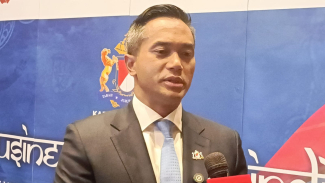The Role of UFWD in Indonesia
- ANTARA FOTO/Aji Styawan
Jakarta – Amidst the complexity of the relationship between Indonesia and China, the role of the United Front Work Department (UFWD), an institution within the Chinese Communist Party (CCP), is gaining prominence.
UFWD, often operating behind the scenes, is tasked with embracing groups outside the CCP and forming alliances to achieve CCP's objectives.
Johanes Herlijanto, Chairman of the Indonesian Sinology Forum, sheds light on its role in China's efforts to exert influence in Indonesia. According to him, UFWD seeks to influence groups outside the party, including the Chinese community and elite businesses.
"Through a united front system controlled by UFWD, China is attempting to export the CCP's political model beyond its borders," he emphasizes during a seminar organized by the Indonesian Sinology Forum.
The significance of UFWD has grown in response to Xi Jinping's belief that overseas Chinese play a crucial role in rejuvenating the Chinese nation.
In response, UFWD has expanded its role, even taking over the responsibilities of the Overseas Chinese Affairs Office (OCAO), which previously handled affairs related to overseas Chinese.

"The current task of UFWD is to embrace overseas Chinese, promote CCP's views and China's influence in their regions, and influence policies in the interest of the CCP," Johanes explains.
The presence of UFWD in Indonesia has raised concerns, and Johanes reminds that its statements aim to influence specific groups in Indonesia to prioritize China's interests.
He also emphasizes the importance of vigilance to ensure that Indonesian groups are not used as tools for the interests of foreign nations.
Professor Tajul Arifin from the State Islamic University Sunan Gunung Djati, Bandung, also highlights the sending of Indonesian students (santri) to China. According to him, the negative impacts outweigh the positive ones.
He is concerned that the santri who go to China, especially those who have just graduated from high school, have limited knowledge and are easily influenced.
The seminar began with a welcoming speech from Professor A Dahana, former professor at the University of Indonesia and the founder of FSI, who encouraged participants to discuss China with an open and critical mindset, without being influenced by feelings of hatred or excessive admiration for the country and the Chinese society.



















